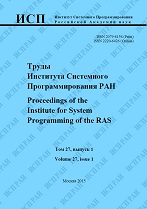|
Reputation systems in e-commerce: comparative analysis and perspectives to model uncertainty inherent in them
M. M. Nosovskiy, K. Y. Degtiarev
National Research University Higher School of Economics
Abstract:
E-commerce is a runaway activity growing at an unprecedented rate all over the world and drawing millions of people from different spots on the globe. At the same time, e-commerce affords ground for malicious behavior that becomes a subject of principal concern. One way to minimize this threat is to use reputation systems for trust management across users of the network. Most of existing reputation systems are feedback-based, and they work with feedback expressed in the form of numbers (i.e. from 0 to 5 as per integer scale). In general, notions of trust and reputation exemplify uncertain (imprecise) pieces of information (data) that are typical for the field of e-commerce. We suggest using fuzzy logic approach to take into account the inherent vagueness of user’s feedback expressing the degree of satisfaction after completion of a regular transaction. Brief comparative analysis of well-known reputation systems, such as EigenTrust, HonestPeer, Absolute Trust, PowerTrust and PeerTrust systems is presented. Based on marked out criteria like convergence speed, robustness, the presence of hyper parameters, the most robust and scalable algorithm is chosen on the basis of carried out sets of computer experiments. The examples of chosen algorithm’s (PeerTrust) fuzzy versions (both Type-1 and Interval Type-2 cases) are implemented and analysed.
Keywords:
e-commerce, reputation system, peer-to-peer computing, trust management, uncertainty, fuzzy logic, linguistic variable, type-1 fuzzy set, type-2 fuzzy set.
Citation:
M. M. Nosovskiy, K. Y. Degtiarev, “Reputation systems in e-commerce: comparative analysis and perspectives to model uncertainty inherent in them”, Proceedings of ISP RAS, 31:3 (2019), 99–122
Linking options:
https://www.mathnet.ru/eng/tisp426 https://www.mathnet.ru/eng/tisp/v31/i3/p99
|

| Statistics & downloads: |
| Abstract page: | 133 | | Full-text PDF : | 122 | | References: | 28 |
|




 Contact us:
Contact us: Terms of Use
Terms of Use
 Registration to the website
Registration to the website Logotypes
Logotypes









 Citation in format
Citation in format 